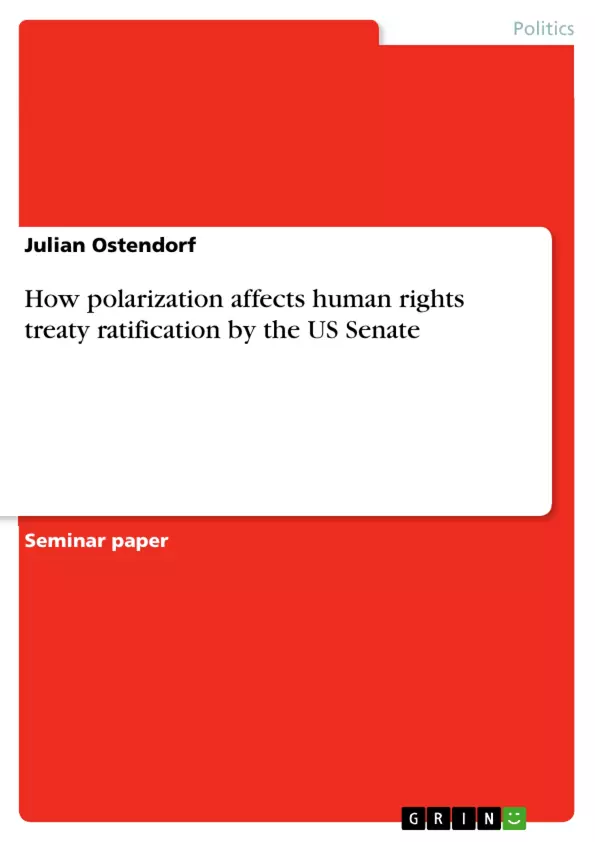This essay traces the link between partisan polarization and ratification of human rights treaties by the US Senate. Therefore, it compares similar designed treaties to investigate the role of partisan cleavages on human rights issues.
Inhaltsverzeichnis (Table of Contents)
- Introduction
- State of the Art and Hypothesis Generation
- Methodical Approach
- Case Selection
- Case Study Analysis
- The Convention against Torture
- The Convention on the Rights of Persons with Disabilities
- Conclusion
- Literature
- Appendix
Zielsetzung und Themenschwerpunkte (Objectives and Key Themes)
This essay explores the US Senate's role in international human rights policy, focusing on the ratification of human rights treaties. The research seeks to understand why the USA, despite its claims of universal human rights as a foreign policy driver, has not ratified key human rights conventions like the Convention on the Rights of the Child and the Convention to Eliminate Discrimination against Women.
- US Senate's role in international human rights policy
- Influence of partisan polarization on treaty ratification
- Impact of institutional hurdles in the US political system
- Use of reservations by the US to limit treaty obligations
- Comparison of ratification processes for the Convention against Torture and the Convention on the Rights of Persons with Disabilities
Zusammenfassung der Kapitel (Chapter Summaries)
The introductory chapter synthesizes previous research on treaty ratification and polarization, formulating a hypothesis that partisan polarization significantly impacts the US Senate's ratification of human rights treaties. Chapter two outlines the methodical approach, detailing case selection and data analysis methods. This is followed by two case studies: one examining the ratification process of the Convention against Torture, and the other focusing on the Convention on the Rights of Persons with Disabilities. The conclusion will draw comparisons between these two cases, highlighting the influence of polarization on ratification outcomes.
Schlüsselwörter (Keywords)
The main keywords of this paper are: US Senate, international human rights policy, treaty ratification, partisan polarization, human rights conventions, Convention against Torture, Convention on the Rights of Persons with Disabilities, reservations, institutional hurdles, US political system, American exceptionalism, international norms.
Frequently Asked Questions
How does partisan polarization affect US treaty ratification?
Partisan polarization creates deep cleavages in the US Senate, making it difficult to reach the two-thirds majority required for the ratification of international human rights treaties.
Why hasn't the US ratified the Convention on the Rights of the Child?
Despite supporting human rights globally, domestic political hurdles, concerns over national sovereignty, and partisan opposition have prevented the US from ratifying this and other key conventions.
What are "reservations" in the context of treaty ratification?
The US often uses reservations to limit its legal obligations under a treaty, ensuring that international norms do not override existing domestic US laws.
How did the ratification of the Convention against Torture differ from others?
The essay compares specific cases to show how different levels of partisan agreement or disagreement influenced the success or failure of the ratification process in the Senate.
What is American exceptionalism in human rights policy?
It refers to the US tendency to promote universal human rights abroad while being reluctant to subject itself to international oversight or treaties that might conflict with domestic legal standards.
- Quote paper
- Julian Ostendorf (Author), 2014, How polarization affects human rights treaty ratification by the US Senate, Munich, GRIN Verlag, https://www.grin.com/document/288603



